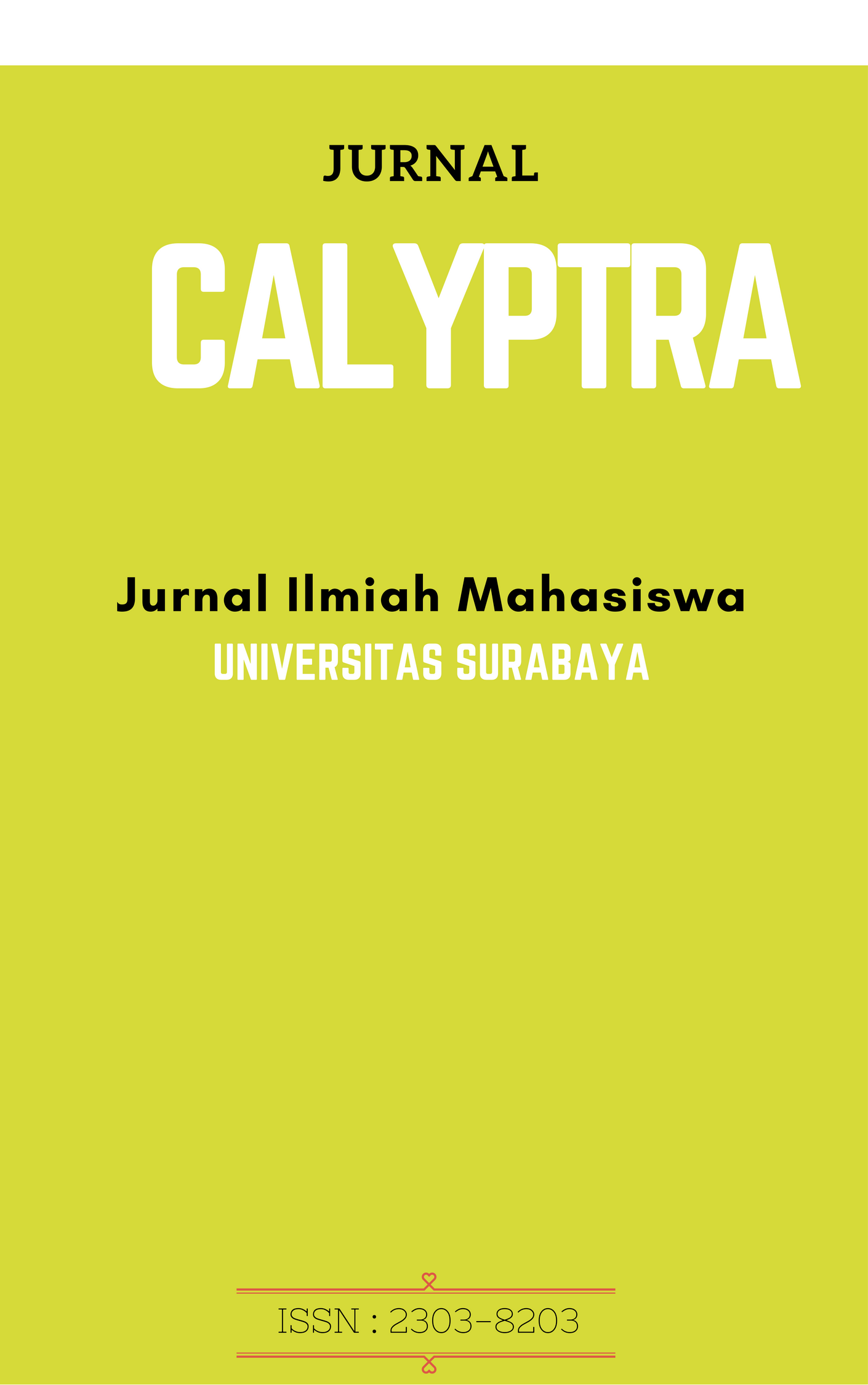PENGARUH CUSTOMER SATISFACTION DENGAN PENGANTAR RELASIONAL TRUST DAN COMMITMENT TERHADAP CUSTOMER LOYALTY PELANGGAN KFC PONDOK CHANDRA SURABAYA
 Abstract Views:
149 times
Abstract Views:
149 times
 PDF - FULL TEXT Downloads:
193 times
PDF - FULL TEXT Downloads:
193 times
Abstract
Intisari - Penelitian ini merupakan replikasi model penelitian yang diajukan pada penelitian Sahagun dan Vasquez (2013). Sekarang ini banyak restoran fast food yang ditawarkan di Indonesia, hal ini membuat konsumen terlihat tidak loyal pada satu restoran fast food. Penelitian ini bertujuan untuk meneliti pengaruh customer satisfaction dengan pengantar relasional trust dan commitment terhadap customer loyalty. Penelitian yang dilakukan menggunakan teknik pengambilan sampel non probability sampling melalui pendekatan convenience sampling.Pengolahan data dilakukan dengan menggunakan Structural Equation Modeling (SEM) menggunakan softwar AMOS 18.0. Jumlah sampel dalam penelitian ini sebesar 165. Hasil penelitian menunjukkan terdapat pengaruh customer satisfaction terhadap trust, trust terhadap commitment, dan commitment terhadap customer loyalty. Melalui penelitian ini dapat disimpulkan bahwa semakin tingginya kepuasan pelanggan terhadap produk dan transaksi, akan menyebabkan semakin tinggi kepercayaan pelanggan, kemudian menyebabkan semakin tingginya komitmen pelanggan untuk melakukan pembelian ulang, yang akhirnya menyebabkan semakin tingginya pelanggan menjadi loyal dalam jangka waktu yang lama.
Kata kunci: Kepuasan, Kepercayaan, Komitmen, Loyalitas Pelanggan, Restoran Cepat Saji
Abstract - This research is a replica of a research method proposed in Sahagun’s and Vasquez’s exploration (2013). Nowadays, there are plenty of fast food restaurant that exist in Indonesia and this fact makes consumers don’t seem to appear loyal to just one fast food restaurant. This study aims to investigate the influence of customer satisfaction using relational methodology of trust and commitment toward customer loyalty. The research was done using the technique of sample obtainment called non probability sampling through an approach called convenience sampling. The process of the data was completed using Structural Equation Modeling (SEM) through a software called AMOS 18.0. The total amount of samples in this research is 165 samples. The result of this research shows that there are effects of customer satisfaction toward trust, trust toward commitment, and commitment toward customer loyalty. Through this research, it can be concluded that the higher the customer’s satisfaction to products and transactions, the higher the customer’s trust will get, resulting greater customer’s commitment to buy from the same restaurant again, which leads to a bigger chance of loyal customer in a long period of time.
Keywords: Satisfaction, trust, commitment, customer loyalty, fast food restaurant
Downloads
References
Bruhn, Manfred, 2003, RelationshipMarketing: Management of Customer Relationship, Upper Saddle River, Prentice Hall.
Callarisa,L.J., Bigne, E., Moliner,M.A., Sanchez, J.,2009. Customer loyalty in clusters: Perceived value and satisfaction as antecedents. J. Bus.Bus. Marketing 16, 276-316
Dimitriades., 2006. Customer Satisfaction, Loyalty, and Commitment in Service Organizations: Some evidence from Greece
Dwyer, F., Schurr,P., Oh,S.,1987. Developing buyer-seller relationship. J. Marketing 51,11-27
Ehrenberg, A.S.C., Goodhardt, G.J., Barwise, P.B., 1990. Double Jeopardy Revisited. J. Marketing 54, p.82-91
El-Refae, 2012. The Relationship between Service Quality, Satisfaction, and Behavioral Intension of Malaysian Spa Center Customers. International Journal of Business & Social Science:2012, Vol.3 Issue 1, p.198
Ferdinand, A., 2002, Structural Equation Modeling Dalam Penelitian Aplikasi Model-Model Rumit Dalam Penelitian Untuk Tesus Magister dan Desertasi Doktor, Badan Penerbit Universitas Diponegoro, Semarang
Hair, J. F. Jr., R.E. Anderson, R.L. Tatham, and W.C. Black, 2006, Multivariate Data Analysis, 6 th edition. International Edition, Upper Saddle River: Prentice Hall Inc.
Kim, D.J., Ferrin, D.L., Rao, H.R., 2003. A study of the effect of consumer trust on consumer expectations and satisfaction: The Korean experience. In: Proceedings of the Fifth International Conference on Electronic Commerce.
Moorman, C., Zaltman, G., Deshpande, R.,1992. Relationships between providers and user of market research: The dynamics of trust within and between
organizations. J. MarketingRes. 29,314-328
Ndubisi, Nelson Oly, 2007a, Relationship Marketing and Customer Loyalty, Marketing Intelligence & Planning, Vol 25 : 98-106
Oliver, R., 1999. Whence consumer loyalty.J.Marketing 63 (Special Issue),33-44
Rangkuti,F., 2002, Measuring Customer Satisfaction. Jakarta : PT. Gramedia Pustaka Utama
Sahagun, Z. Vasquez-Parraga., 2013. “Can Fast-Food Consumers Be Loyal Customers, If So How? Theory, Method and Findings”, Journal of Retailing and Consumer Services 21, p.168-174
Setyo Hari Wijanto, 2008. Structural Equation Modeling dengan Lisrel8. 8 Konsep dan Tutorial, Graha Ilmu.
Singgih Santoso, 2011. Structural Equation Modeling. PT. Elex Media Komputindo.
Tjiptono, F., Y. Chandra, dan A. Diana, 2004. Marketing Scales, Yogyakarta: Andi.
Yusrizal, 2008. “Pengujian Validitas Konstruk Dengan Menggunakan Analisis Faktor” Jurnal Tabulasa PPS UNIMED Vol. 5 No.1, Juni 2008
Zamora-Gonzales., Vasquez-Parraga, A., Morales-Diaz., F., Cisternas-Ramirez., C., 2004. “Formation process of guest loyalty: Theory and empirical test. Stud. Perspect. Tourism 13 (3), p.197-221
- Articles published in CALYPTRA are licensed under a Creative Commons Attribution-ShareAlike 4.0 International license. You are free to copy, transform, or redistribute articles for any lawful purpose in any medium, provided you give appropriate credit to the original author(s) and the journal, link to the license, indicate if changes were made, and redistribute any derivative work under the same license.
- Copyright on articles is retained by the respective author(s), without restrictions. A non-exclusive license is granted to CALYPTRA to publish the article and identify itself as its original publisher, along with the commercial right to include the article in a hardcopy issue for sale to libraries and individuals.
- By publishing in CALYPTRA, authors grant any third party the right to use their article to the extent provided by the Creative Commons Attribution-ShareAlike 4.0 International license.



